FHL 492: Ecology and Conservation of Marine Birds and Mammals
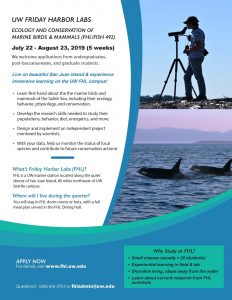
FHL 492 has now been approved for the ‘Integrative Field Experience’ requirement of the Marine Biology major, and spaces are still available in the summer 2019 offering. Visit https://fhl.uw.edu/courses/course-descriptions/course/ecology-and-conservation-of-marine-birds-and-mammals-2019/ for more information.
Read moreDiversity in STEM Seminar: Spring Quarter Course (GEN ST 297C)
Learn about current UW STEM Research in a diversity context directly from UW researchers, graduate students, staff and faculty.
Read moreRed Sea Summer Program 2019
KAUST’s Marine Science program will be hosting a three-week summer course from July 21 to August 8, 2019. The course will highlight a range of topics relevant to the Red Sea Research Center’s work, including genomics, microbiology, ecology, environmental science, and biological oceanography. Several KAUST faculty will be participating. The course will consist of a combination of lectures, fieldwork, labwork, and data analysis workshops, with an emphasis on hands-on experiences.
Read moreSpring 2019 FISH 497 B: Special Topics: FieldNotes
Help produce FieldNotes – an environmental journal focused on promoting undergraduate research and telling inspiring stories about the world around us. Work with a team to create the next issue of FieldNotes by writing and editing short articles, capturing imagery, designing the layout, and more!
Read moreUW instructors get out of their comfort zone and adopt classroom technologies to enhance the student learning experience
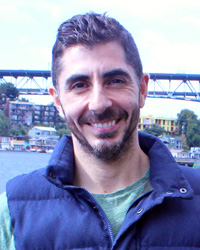
Marine biology instructor José Guzmán flipped his classroom; upending the traditional way of teaching and learning, with instructors delivering lectures online so students can learn outside the classroom at their own pace and time. More interactive activities, such as tackling case studies, move into the classroom, allowing students to work together and with the instructor to solve problems. Video has become a key tool to deliver important material outside the classroom, which had been previously done in a lecture format.
Read moreFISH 427: Tropical Marine Biology
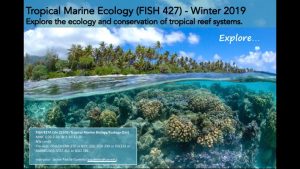
By examining the biogeography, evolution, and ecology of coral reefs, mangroves, and sea grass beds, provides an integrated overview of tropical-systems biology. Integrates ecological and physiological concepts in order to show how anthropogenic stressors such as increased temperature, pollution, and ocean acidification can impact the resilience of tropical marine ecosystems.
Read moreQ SCI 497 Special Topics: Agent Based Modelling (winter 2019)

Q SCI 497 Special Topics in Quantitative Science: Agent Based Modelling (4 credits)
Agent-based models (aka individual-based models) provide a flexible framework for creating simple representations of complex phenomena in the life, social and physical sciences. In this play-based course we will learn to design, build and perform computational experiments using agent-based models. Along the way you will learn useful programming and data visualization skills
Read moreFISH 464: Arctic Marine Vertebrate Ecology
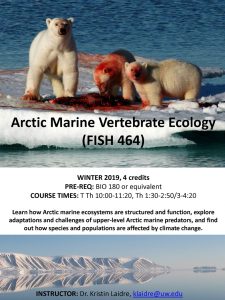
FISH 464 Arctic Marine Vertebrate Ecology (4cr) – TTh 11:30-12:50, Th 1:30-2:50 or 3:00-4:20
Learn how Arctic marine ecosystems are structured and function, explore adaptations and challenges of upper-level Arctic marine predators, and find out how species and populations are affected by changes in the Arctic.
NW, BIOL 180 prerequisite
AIS 375: Engaging the Waterways class (autumn 2018)
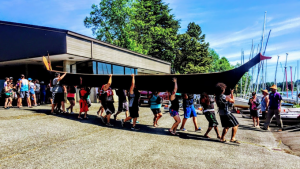
AIS 375 is a special topics course titled Engaging the Waterways and will look specifically at the geographical, ecological, and cultural history of the physical campus grounds. It’s a hands-on course centered around the arrival of the Willapa Spirit honor canoe on campus this Autumn and will include walking tours, hearing from Native community elders and Canoe Families, and field expeditions.
Read moreBermuda Institute of Ocean Sciences summer courses

Each summer, BIOS offers a suite of courses for both undergraduate and graduate students that capitalizes upon the expertise of our faculty and visiting scientists. These courses, listed below, provide many students the opportunity to study topics in marine science that might not be offered within the curricula of their home institutions. Each course comprises lectures, laboratory exercises, and complementary field components that build upon what is learned in the classroom. Partial scholarships may be available to all students.
Read more